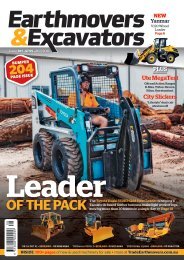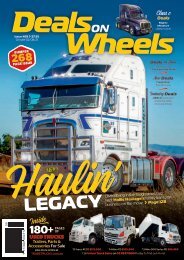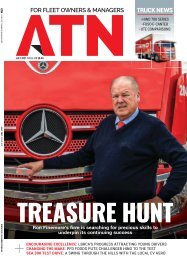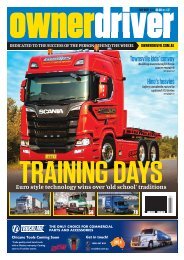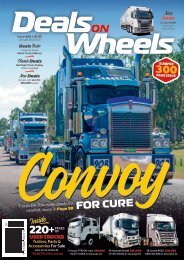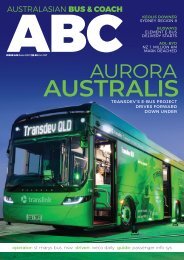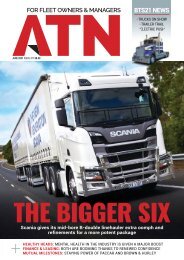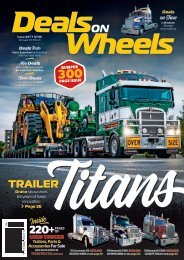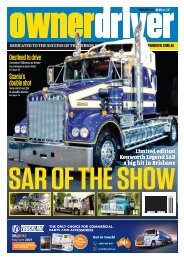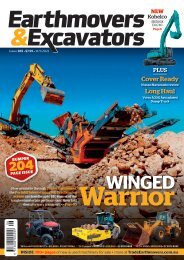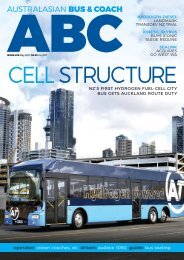Owner/Driver #339
Create successful ePaper yourself
Turn your PDF publications into a flip-book with our unique Google optimized e-Paper software.
tech briefs<br />
Toyota, Hino and Isuzu partner up<br />
ISUZU, HINO AND TOYOTA are to collaborate<br />
on commercial vehicles battery and fuel<br />
cell developments focused on the latter’s<br />
computer-aided software engineering (CASE)<br />
technologies, the Japanese trio reveal.<br />
Focused on light trucks, the trio plans to<br />
jointly work on the development of battery<br />
electric vehicles (BEVs) and fuel cell electric<br />
vehicles (FCEVs), autonomous driving<br />
technologies, and electronic platforms.<br />
“While working together on BEVs and<br />
FCEVs to reduce vehicle costs, the three<br />
companies plan to advance infrastructurecoordinated<br />
societal implementation, such as<br />
by introducing FCEV trucks to hydrogen-based<br />
society demonstrations in Japan’s Fukushima<br />
Prefecture, and accelerate their dissemination<br />
initiatives,” they say.<br />
“Also, Isuzu, Hino, and Toyota plan to link<br />
their connected technology platforms to build<br />
a platform for commercial vehicles that can<br />
help solve customers’ problems.<br />
“Through this platform, they intend to<br />
provide various logistics solutions that not only<br />
help improve commercial vehicle transport<br />
efficiencies but also contribute to reducing<br />
CO2 emissions.”<br />
It has been a transformative time for Isuzu<br />
recently.<br />
With a more heavy-duty focus, the firm<br />
entered a 2019 technology link with Volvo<br />
globally that saw it gaining control of UD.<br />
Explaining the move, Toyota president Akio<br />
Toyoda says CASE developments changes the<br />
investment and development playing field for<br />
the global automotive enterprise.<br />
“What we are now being called upon to do<br />
is refine CASE technologies and disseminate<br />
them,” Toyoda continues.<br />
“To achieve that, I arrived at the notion that<br />
it is important to implement such technologies<br />
through commercial vehicles in unison with<br />
infrastructure.<br />
“And there was one more thing. Viewed from<br />
a user’s perspective, shippers use both Hino<br />
and Isuzu trucks.<br />
“If Hino and Isuzu work together, we would<br />
be able to face 80 per cent of Japan’s commercial<br />
vehicle customers and come to know their<br />
reality.<br />
“And if we used Toyota’s CASE technologies, we<br />
may be able to solve many of those customers’<br />
difficulties.”<br />
He adds that the location of the action is<br />
motivated by the earthquake and tsunami that<br />
devastated the region and admits the initiative<br />
has his company entering uncharted waters.<br />
“This year marks the 10th anniversary of the<br />
earthquake disaster, so I was wondering which<br />
site I should visit,” Toyoda says.<br />
“As I was thinking about it, I was given<br />
an opportunity to visit Namie Town in<br />
Fukushima Prefecture, which is advancing<br />
initiatives for the future.<br />
“On-site, I was able to talk with Fukushima<br />
governor Uchibori and Namie mayor Yoshida<br />
about their thoughts on reconstruction.<br />
“One project has advanced since then. Isuzu<br />
and Hino fuel cell trucks are carrying goods<br />
using green hydrogen produced in Namie<br />
Town.<br />
“And we will contribute to the realization<br />
of uniform, waste-free delivery by linking<br />
‘make’, ‘transport’, and ‘use’ using connected<br />
technology.<br />
“Together with everyone in Fukushima, we<br />
will make the work of ‘transport’ people easier<br />
and propose new lifestyles to people on the<br />
‘use’ end.<br />
“We are now living in an uncharted era in<br />
which we can’t foresee the right direction.<br />
“In such an environment, you first<br />
have to try. From there you can see what’s<br />
waiting next and try again. Toyota has<br />
Above: Hino and Toyota agreed to jointly develop a heavy-duty fuel<br />
cell truck back in April 2020<br />
survived so far by doing so again and again.<br />
“This time, engaging more in the transportation<br />
front line, our three companies will work together<br />
and try it first.”<br />
To promote their partnership, Isuzu, Hino,<br />
and Toyota are establishing Commercial Japan<br />
Partnership Technologies Corporation (CJPTC).<br />
To be headed by Hiroki Nakajima, it is a company<br />
for planning CASE technologies and services for<br />
commercial vehicles based on discussions among its<br />
three parent companies.<br />
“Going forward, Isuzu, Hino, and Toyota intend<br />
to deepen their collaboration while openly<br />
considering cooperation with other like-minded<br />
partners,” they add.<br />
Isuzu Trucks Australia CEO Andrew Harbison<br />
welcomed the latest strategic alliance by Isuzu’s<br />
parent company in Japan.<br />
“With the building of a connected technology<br />
platform another key objective of the collaboration,<br />
we see a clear path for Isuzu in this critical response<br />
to the challenges facing the commercial vehicle<br />
industry and our customers,” Harbison says.<br />
Isuzu and Toyota have agreed on a capital<br />
partnership for the project, with Toyota gaining<br />
around 5 per cent of Isuzu for Yen42.8 billion (A$510<br />
million), while Isuzu plans to acquire Toyota shares<br />
of the same value through a market purchase.<br />
MOORE<br />
Moore trailer for your money!<br />
TRAILERS<br />
07 4693 1088<br />
www.mooretrailers.com.au<br />
80 APRIL 2021 ownerdriver.com.au



